
FAQ: Is ID just a religious or theological concept?
The Long Answer: This article adapted from our "Religious and Scientific Affiliations Page" and from our article "Intelligent Design Theory, and the Relationship between Science and Religion. Introduction When discussing the subject of "origins" (i.e. the question "How did we get here?", people often make both religious and scientific claims. Additionally, people have many different views on the proper relationship between science and religion. The purpose of this FAQ is to discuss the nature of science, the nature of religion, and the relationship of science and religion. The article will show how intelligent design theory is science, and not religion, and that while many proponents of intelligent design have religious beliefs, this affect neither the quality of the science of intelligent design nor does it negate the secular, scientific basis of the theory of intelligent design. What is science? "Science is a particular way of knowing about the world." So says the National Academy of Science in its Teaching about Evolution and the Nature of Science.1; see also ref. 2 A primary goal of science is to understand nature, where "understanding" means "relating one natural phenomena to another and recognizing the causes and effects of phenomena."1 Progress in science consists of the development of better explanations for the causes of natural phenomena.1 Although there is no "demarcation" definition of science agreed upon by all philosophers of science,3 many scientists and philosophers have suggested that scientific explanations are: 1. Based upon results obtained through observations and experiments that can be substantiated by other scientists.1,2 2. Subject to testing because scientists can observe the natural world to see if the explanation holds up.4, 5 3. “Falsifiable,” in the sense that some type of observations could conceivably count against the theory.4, 5 4. "Tentative," meaning that they are not held absolutely but are held subject to state of the evidence.1 As the National Academy of Sciences explains, observations (often via experimentation) are fundamental to science: The Scientific Method: As seen at left, scientific understanding begins with observations. Scientists then make a hypothesis to explain those observations. The hypothesis should make predictions which can be tested via experiments.17 If the predictions of the hypothesis are verified, it is concluded that the hypothesis is supported by the scientific data. That conclusion is an observation in-and-of itself, which can form the basis for further hypotheses, experiments, and conclusions. In this way, scientific knowledge builds upon itself:  Thus, scientific knowledge is at its heart based upon observations and experiments. Another way of putting it is that science is based upon empirical data. What is religion? Religion is another way of "knowing about" the natural world. While science bases all statements upon observations, religion bases many of its statements upon faith or divine revelation. The main difference between religion and science is that only religion has a component of faith. Faith statements are not ultimately based upon the observable, and are not tentative, nor testable nor falsifiable through the scientific method, but are believed to be true for reasons that go beyond empirically observable evidence--often because of divine revelation. Because religion has faith, religious beliefs are held absolutely, and faith may maintain religious beliefs if there is an absence of confirming evidence. Scientific beliefs are said to be "tentative," for nothing in science is absolutely proven; scientific claims are only said to be "supported to a given degree by the evidence." Only religious beliefs are "dogmatic" in the sense that they are claimed to be absolutely known to be completely true. Religious claims are not necessarily any less valid than scientific claims. Some religious beliefs may even be testable and/or supportable by "empirical data." For example, one could envision empirical evidence for the resurrection of Christ. Jesus himself did not teach that the Christian faith is blind, as he helps his disciple Thomas who doubted that Jesus had really risen from the dead: (John 20:27, NIV) (John 20:29, NIV) Do Science and Religion Overlap? When talking about the question, "How did we get here?" (i.e. origins) both science and religion speak. An accurate model of science and religion must recognize that fact: 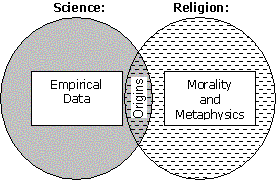 Science and religion are both different "ways of knowing" can be different ways of knowing about the same thing: origins. Science knows things through the scientific method. Religion knows things through faith and divine revelation. Science approaches the subject of origins through the scientific method. Religion approaches the subject of origins from faith and divine revelation: 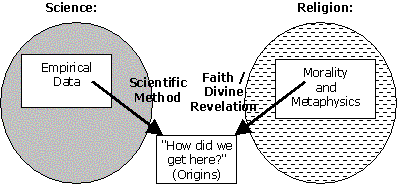 Is Intelligent Design Theory Science or Religion? Intelligent design is an answer to the question, "How did we get here?" If understanding in science is to "recogniz[e] the causes and effects of phenomena"1 and scientific progress "consists of the development of better explanations for the causes of natural phenomena"1 then if certain natural objects were caused by intelligent design, then it would increase scientific understanding would science would undergo progress to discover that fact. Yet, a common question about intelligent design is if it is a "religious" or "theological" concept or if it is a scientific theory. Part of the confusion stems from the fact that one can answer the question "How did we get here?" with "Life was intelligently designed" by using both scientific methods or the methods of religion: 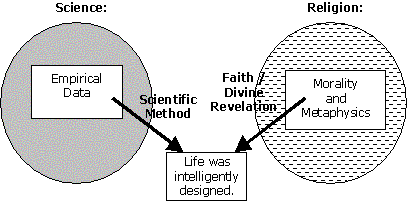
Before one can understand why intelligent design theory is science, and not religion, one needs to understand how intelligent design theory works, and why it is based off of the scientific method, and not faith or divine revelation. The following is a description of the logical steps one takes to infer that an object was designed through intelligent design theory:
In this description, only the scientific method, via observations of the natural world, is used to conclude that life was designed. There is no appeal to the supernatural, and no reliance upon faith or divine revelation (including any religious text). Intelligent design thus uses none of the "methods" of religion in makings its claims. However, it should be noted that many religions may teach that life was intelligently designed. While intelligent design theory makes claims about the natural world which are consistent with these religious claims, intelligent design theory is science not because of the claims it makes, but because of how it makes those claims. Remember, science is a "way of knowing"--not a set of things which can be known. If a conclusion may be arrived at through the scientific method, even if some religious faith or divine revelation is coincidentally teaching that same conclusion, it is scientific. In determining if something is science or religion, what matters is not the claim you are making, but how and on what basis you are making the claim. What you 'know,' or what your claims are about, do not determine whether those claims are religious or scientific. Rather, it is the 'way,' or means by which one makes those claims that makes them religious or scientific. Intelligent design theory is a purely scientific way of arriving at the conclusion that life was designed, even if that conclusion may also be reached via religious means. Understanding the Identity of the Designer: The scientific theory of intelligent design cannot name the identity of the designer, but only detects the past occurrence of intelligent design in the natural world. Intelligent design theory cannot name the designer because it works off the assumption that all designers in general create a certain type of information when they act. While we can detect that type of information in the natural world to infer intelligent design, finding that type of information does not give us any more information about the designer other than that the designer intelligently designed the object in question. Consider the following diagram: 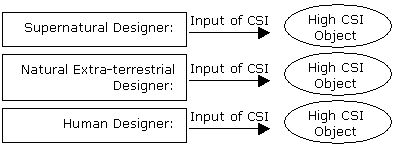
In this diagram, many types of intelligent agents could produce identical objects with high levels of CSI. Intelligent design theory can only find the object containing high levels of CSI and works backwards. While it can detect that the object was designed, it cannot discriminate what kind of designer designed the object, nor determine any specific properties about the designer, other than that it was an intelligent agent. All intelligent design theory can infer is that the object was designed. Intelligent design, as a scientific theory cannot identify the identity of the designer. Not identifying the designer is not a cop-out nor does it stem from an unwillingness to be honest about motivations. It results solely from the pure empirical limitations of scientific investigation: 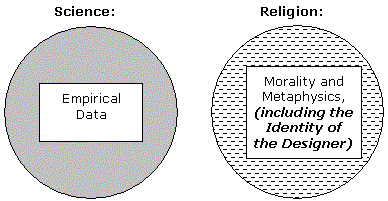
Common Arguments Against the Scientific Nature of Intelligent Design: Motivations and Religious Affiliations It has been argued by many critics of intelligent design theory that ID is religion because of the religious affiliations of many groups or individuals promoting intelligent design theory, or because of the nature of the subject. Many have argued that because many theists promote intelligent design theory, it must be a religious concept. However, to attribute characteristics to something just because those affiliated with it have certain characteristics is to commit what is known as the genetic fallacy or to make what is called an ad hominem argument. Neither of these are valid lines of argumentation. The "genetic fallacy" occurs when one judges an idea based on its past or its origin. In reality the origin or history of an idea is irrelevant to its present properties. It does not follow that because some proponents of intelligent design are religious, that therefore intelligent design theory must be a religious concept. An ad hominem argument criticizes a person rather than an argument. To criticize a person because they are religious, or have religious motivations, does not therefore mean that their claims (such as intelligent design) are unscientific. Religious motivations are irrelevant to determining if an idea is scientific or scientifically true. Many famous scientists, such as Kepler and Newton, used their religious beliefs to justify their belief that God created an ordered and rationally comprehendible universe. Their religiously motivated scientific claims were confirmed, leading to hundreds of years of fruitful scientific progress. Even if these fallacious arguments were true, there are still intelligent design organizations with no religious affiliation. The International Society for Complexity, Information, and Design (ISCID), founded by William Dembski in 2001, is a professional research society that investigates the purely empirical scientific methods for detecting intelligent design. There are individuals with a wide variety of religious and metaphysical beliefs who see merit to intelligent design theory and are fellows of ISCID. ISCID has no religious requirements for membership. Religions Premises vs. Religious Implications: Since both science and religion speak about the subject of origins, science can often agree with some religious claims. In these instances a genuinely scientific theory--not built upon religious premises--may have religious implications. A theory is scientific if it has scientific premises--and is not based upon religious premises. However, the fact that a theory has scientific premises does not mean it cannot have religious implications. Many have seen the scientific theory of evolution as having religious implications. Stephen Jay Gould wrote that evolution has very particular religious implications for humanity: But what about quotes from ID proponents talking about ID as if it were religion? Some people amass quotes from intelligent design proponents where they are talking about intelligent design as if it is merely a religious concept. Various quotes are often given trying to show that ID proponents are merely making religious arguments in favor of intelligent design. William Dembski, a mathematician and philosopher who has written on intelligent design from both a religious and a scientific perspective, says the following on this matter: "For more than a century we have heard that scientific progress has made Christian belief obsolete. Given the cultural prestige of science, this claim has prevented many from considering the Christian faith. If intelligent design theory exposes the inadequacy of materialistic explanations in the natural sciences, it will deflate this assertion, and could contribute to a renewal of Christian belief in the twenty-first century. This would be its most significant apologetic contribution." (Jay Wesley Richards, Signs of Intelligence: Understanding Intelligent Design edited by William A. Dembski and James M. Kushiner) "Although intelligent design fits comfortably with a belief in God, it doesn't require it, because the scientific theory doesn't tell you who the designer is. While most people - including myself - will think the designer is God, some people might think that the designer was a space alien or something odd like that." (Michael Behe, Pittsburgh Post-Gazette, 02/08/01) "The objective [of the Wedge Strategy] is to convince people that Darwinism is inherently atheistic, thus shifting the debate from creationism vs. evolution to the existence of God vs. the non-existence of God. From there people are introduced to 'the truth' of the Bible and then 'the question of sin' and finally 'introduced to Jesus.'" (Phillip Johnson, "Missionary Man", Church & State, April 1999) "He [Reverend Sun Myung Moon] frequently criticized Darwin's theory that living things originated without God's purposeful, creative activity... (Jonathan Wells, "Why I Went for a Second Ph.D.", 1996, [www.tparents.org/Library/Unification/Talks/Wells/DARWIN.htm]) To see the charges made against intelligent design in action, consider these two charges from the ID-critical book, Creationism's From Trojan Horse (pg. 273): […] "Phillip Johnson … made it crystal clear that ID is creationism: … "The idea of divine creation, which is what I'm talking about, [is] that there is an intelligence behind life." (Creationisms Trojan Horse, by Paul R. Gross and Barbara Forrest, pg. 273, 274) If ID critics are going to use quotes like these to prove that ID is creationism, religion, or theology, then they have a very weak case indeed. Because both religion and science can speak to intelligent design, one has to ask how one knows that life is designed. ID as a scientific theory does not know that life is designed because of divine revelation, and indeed it does not come to the conclusion that life was supernaturally designed. It can only tell you that life was designed, and nothing more. This scientific theory of intelligent design is what ID proponents would like to see scientists consider, and perhaps one day schools to teach. But religious investigations of the implications of intelligent design theory are not appropriate for science. References: 1. Teaching About Evolution And The Nature of Science (National Academy of Press, 1998). 2. Science and Creationism, A View from the National Academy of Sciences, 2nd Edition (National Academy Press, 1999). 3. Many philosophers of science reject "demarcation arguments" between science and non-science. See "The Demise of the Demarcation Problem" by Larry Lauden in But Is It Science?, edited by Michael Ruse (1988). 4. Popper, K., Conjectures and Refutations, p. 257 (1963). 5. Ayala, F. J., "Biological Evolution: Natural Selection or Random Walk?," American Scientist, 62:700 (1974). 6. Mark 12:30, NIV; emphasis added. 7. 1 Thessalonians 5:21, NIV. 8. Dembski, W. A., Eugenie Scott and the NCSE: Darwin's Predictable Defenders. 9. Gould, S. J., "So Cleverly Kind an Animal," in Ever Since Darwin: Reflections in Natural History, p.267 (1991, reprint). 10. Provine, W. B., "Evolution: Free will and punishment and meaning in life," http://fp.bio.utk.edu/darwin/1998/provine_abstract.html. 11. Dawkins, R., The Blind Watchmaker, p.6 (1986). 12. Simpson, G. G., The Meaning of Evolution, (1967) p. 345. 13. Miller, K. and Levine, R., Biology (1995). 14. 1995 Statement of the National Association of Biology Teachers. 15. Gould, S. J. in "The Meaning of Life," Life Magazine, pg. 84 (Dec. 1988). 16. Graham, B., in The Meaning of Life, by David Friend and the editors of Life Magazine, pg. 104 (1991). 17. Experimentation acts as the workhorse for the scientific method. Experimentation allows us to isolate a particular object of interest, usually referred to as a “variable.” Experimenters do a comparison between their “variable” group or condition with the “control” or “normal” group or condition. In other words, they’ll often run two experiments – one with the “variable” and one without. Then, they compare the two results to see if there are differences. If the differences match what the expectations are (i.e. the hypothesis), then the hypothesis is said to have “experimental support.” One thing that is crucial in experimentation is to try to limit experimenter bias – that is, that the person doing the study may skew their results to be more favorable to their particular outcome. Limiting the effect of this “observer/experimenter bias” can be accomplished in one of two ways: 1) through double blind experiments, and 2) through repetition by independent scientists. Double blind experiments are often done with medical drugs. In these kinds of experiments, not only is the patient unsure if they are getting the actual drug (i.e. the “variable”), but so is the doctor administering the pill/shot/etc. This is one way to help ensure honesty in the results. But, repeatable experiments are often used as well, sometimes in conjunction with the former. Once a particular experiment is run and the methods and results of the experiment are shared with others, the other groups can run the same experiment to see if they get the same results. Consistent results between independent groups adds to the validity of the first groups findings. These are the ways that the scientific method allows a means of “checks-and-balances” to make sure there is no “horsing around” with the data going on in the experiments. You don’t want to pay money to take a new drug only to find out that, in reality, it had no appreciable affect to treat whatever it is you’re taking it for – that defeats the purpose. |
Other FAQs: Philosophical / Religious / Theological FAQs: Scientific FAQs: Political / Educational FAQs: |